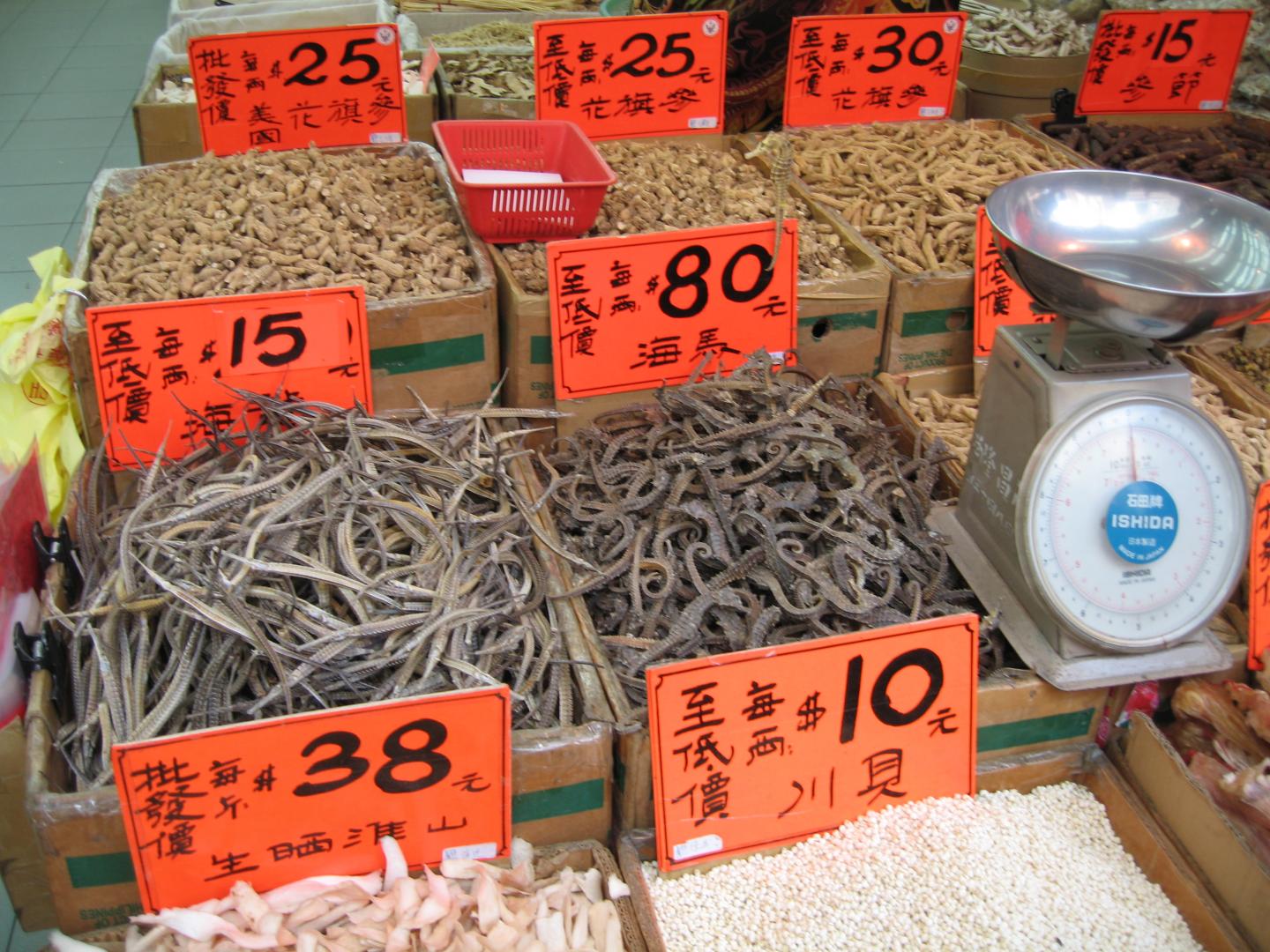National legislation as well as bans under the international CITES agreement not slowing the trade in seahorse products

Credit: ©Amanda Vincent, Project Seahorse
Many countries are engaged in a vast illegal and unrecorded international trade in seahorses, one that circumvents global regulations, according to new UBC study that has implications for many other animal species.
The United Nations Convention on International Trade in Endangered Species of Wild Fauna and Flora (CITES) restricts exports of seahorses to those that have been sourced sustainably and legally. Seahorses were the first marine fishes subject to such regulation, largely because of work by the Project Seahorse team at UBC’s Institute for the Oceans and Fisheries.
The goal of this CITES regulation was sustainable use but most countries that exported large numbers of seahorses have subsequently either chosen to ban exports or had bans imposed on them by CITES. Approximately 98 per cent of seahorses previously found in global trade came from countries that have now imposed bans, so both exports and imports should more or less have ended.
However, the new research from UBC indicates that many nations with bans apparently continued to export dried seahorses, thus neither meeting their obligations under CITES nor enforcing the trade bans.
“The 183 Parties to CITES are required to limit export of species that have been placed on Appendix II, including seahorses, to levels that are safe for wild populations. Many are struggling to meet this obligation,” explains Dr. Amanda Vincent, senior author on the paper, professor in UBC’s Institute for the Oceans and Fisheries, and co-founder and Director of Project Seahorse.
“We found that 95 per cent of dried seahorses in Hong Kong’s large market were reported as being imported from source countries that had export bans being in place, including Thailand, the Philippines, Indonesia, India, Malaysia, and Viet Nam,” noted Dr. Ting-Chun Kuo, co-author and, during the study, a PhD candidate in Project Seahorse.
“This is a remarkable discovery given the high proportion of global seahorse trade that goes through Hong Kong,” commented Dr. Sarah Foster, lead author and Research Associate with Project Seahorse. “Such illegal shipments lacked the required CITES records and permits. This means that many seahorse populations continue to be under heavy pressure without CITES oversight of sources and sustainability of trade.”
Dr. Vincent, who also Chairs the global expert group on seahorses, points to problematic fishing methods as a driver of the trade. “The great majority of seahorses are obtained as bycatch in bottom trawls and other non-selective fishing methods. Such indiscriminate fishing obtains at least 37 million seahorses each year, a vast number that can easily enter trade. It is vital that such fisheries be constrained, even as trade is regulated.”
“It is going to take all actors and agencies to curb the substantial illegal trade in seahorses and other marine wildlife,” noted Dr. Foster, also Global Trade Officer for the expert group on seahorses. “CITES needs to work more closely with the nations involved to ensure strict enforcement so that traders reject seahorses from source countries with trade bans, and authorities impose penalties such as confiscation and stiff fines.”
That said, it would be far better for CITES members to manage their trade sustainably than to declare bans that are not implemented. At present, most seahorse trade occurs in a black market, neither tracked nor regulated.
“The current high level of illegal activity may have significant consequences for conservation of wild populations. Getting this right is vital for seahorses and for the other marine fishes subject to CITES regulation, such as sharks, rays, Napoleon wrasse and European eels,” concluded Dr. Vincent.
###
This research “Global seahorse trade defies export bans under CITES action and national legislation” by Sarah Foster, Ting-Cho Kuo, Anita Kar Yan Wan and Amanda Vincent was published in Marine Policy.
BACKGROUND
Project Seahorse
Project Seahorse is a marine conservation group based at the University of British Columbia, Canada, and Zoological Society of London. Project Seahorse works to protect seahorses in order to support ocean conservation more broadly, generating cutting-edge research and using it to inform highly effective conservation interventions. Led by Dr. Amanda Vincent and Dr. Heather Koldewey, both global experts on seahorse conservation, Project Seahorse works in collaboration with researchers, governments, conservation groups and local communities worldwide. Its accomplishments have been recognized with many international awards and honours, including the Rolex Award for Enterprise and the Whitley Award in Animal Conservation.
CITES
CITES (the Convention on International Trade in Endangered Species of Wild Fauna and Flora) is an international agreement among governments. Its aim is to ensure that international trade in specimens of wild animals and plants does not threaten their survival. Annually, international wildlife trade is estimated to be worth billions of dollars and to include hundreds of millions of plant and animal specimens. The trade is diverse, ranging from live animals and plants to a vast array of wildlife products derived from them, including food products, exotic leather goods, wooden musical instruments, timber, tourist curios and medicines. Levels of exploitation of some animal and plant species are high and the trade in them, together with other factors, such as habitat loss, is capable of heavily depleting their populations and even bringing some species close to extinction. For many years CITES has been among the conservation agreements with the largest membership, with now 183 Parties. CITES provides a framework within which each Party has to adopt its own domestic legislation to support its CITES obligations.
The upcoming 18th meeting of the Conference of the Parties to CITES – which takes place in Colombo, Sri Lanka from 23 May to 3 June 2019 – will formally discuss Issues relating to the implementation of marine fish listings under the Convention.
Media Contact
Katherine Came
[email protected]
Original Source
http://oceans.
Related Journal Article
http://dx.




